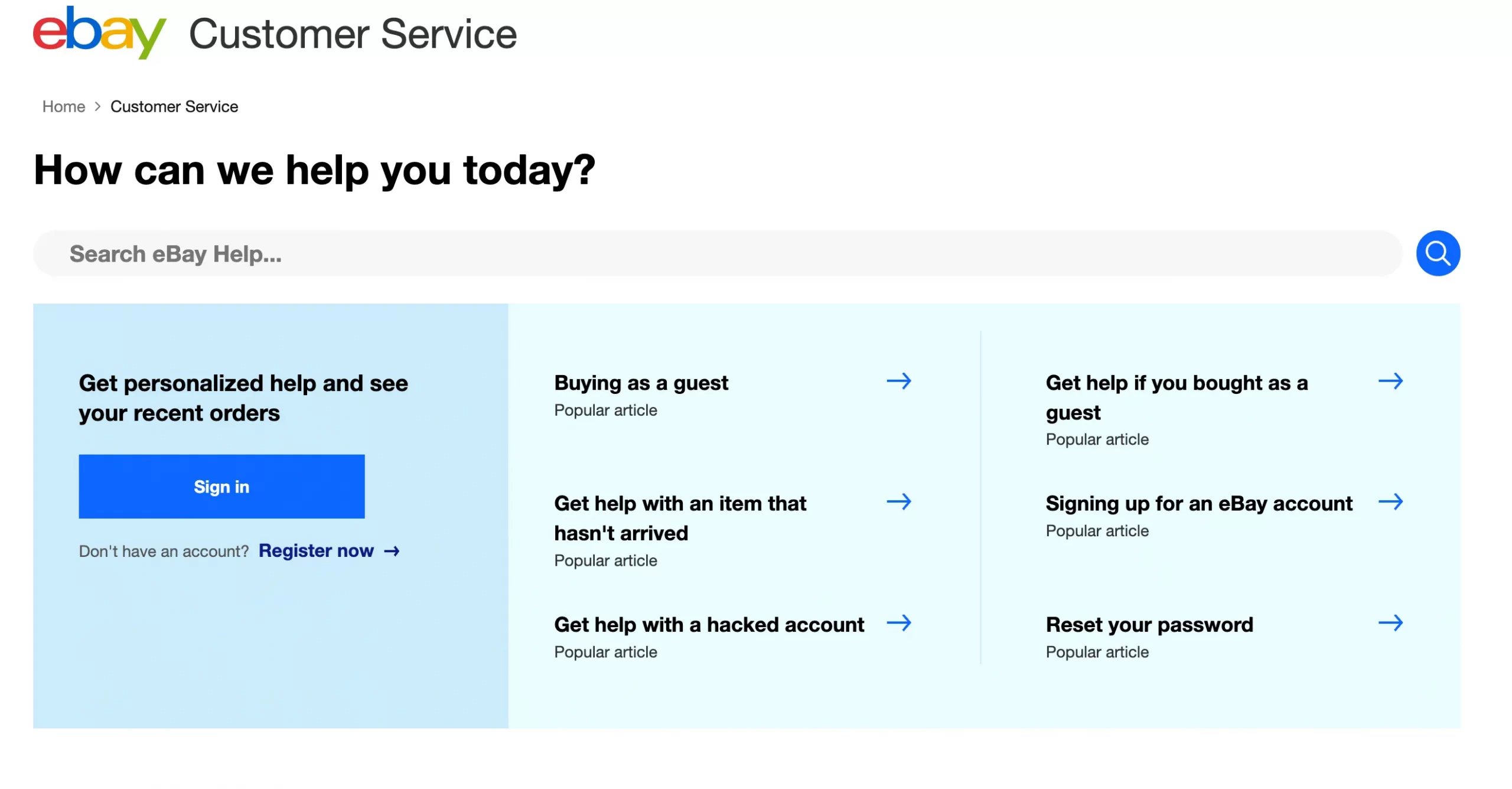If you’re looking to start an eCommerce business, choosing the right online platform can be a make-or-break decision. When it comes to selecting between options, the comparison that gets a lot of attention is between Shopify vs eBay – one is a robust website builder, and one is a popular marketplace.
Both platforms can offer sellers unique benefits and features to assist them in selling online. Thus, it’s important to evaluate their pros and cons carefully to determine the one that fits your needs.
In this article, LitExtension – #1 Shopping Cart Migration Expert will compare the differences in the features of Shopify vs eBay to help you make a more informed decision. Here are the key points to take notice of:
- Overview of Shopify vs eBay for more information
- In-depth comparison of the features of Shopify vs eBay
- Which platform will be the right choice for your business
Which will be the eCommerce solution that lives up to your expectations? Let’s read on and find out!
Power Your Vision on Shopify with LitExtension
Our team of experts can safely transfer your business data, products, customers, and orders to unlock more growth in this promising eCommerce platform. Let us provide a customized migration for you!
Overview of eBay and Shopify
What is Shopify?
Shopify is an all-in-one website builder that allows businesses of all sizes to create and manage their online stores. Founded in 2006, Shopify has quickly claimed its place among the most popular eCommerce solutions on the market today.

One of the most notable features that’s worth mentioning is Shopify’s ease of use. This website builder allows users to build functional online stores from scratch without any technical or coding experience. With its drag-and-drop interface and customizable themes, Shopify makes it easy for businesses to design a storefront that matches their brand and style.
In addition to its flexible customization options, Shopify offers a wide range of eCommerce features, including payment processing, third-party integrations, and analytics tools. With Shopify, businesses can manage all aspects of their online store from one convenient dashboard, saving time and increasing efficiency.
For more detailed information on this platform, read our Shopify review.
What is eBay?
eBay is a global marketplace that allows merchants to sell their products to buyers around the world. With its vast user base, low fees, and global reach, eBay provides businesses with a unique opportunity to reach millions of potential customers.

Using eBay, businesses can conveniently list their products on a trusted platform without having to build their own website from scratch. Therefore, even solo sellers with just 1 or a few products can access online selling with ease. eBay also offers a variety of tools to help businesses succeed in a competitive eCommerce landscape.
eBay also allows sellers to auction off a product. You can do this by specifying a starting price for the items and opening the bidding processes between buyers. When the listing ends, buyers with the highest offer get to buy the desired items.
Shopify vs eBay: Detailed Comparison
1. Platform type
The primary difference between Shopify and eBay is the type of platform they are categorized into. Shopify is an eCommerce website builder that allows businesses to create their own website, while eBay is an online marketplace that connects buyers and sellers.
Shopify
Shopify provides businesses with a fully customizable online store that can be tailored to fit unique branding and product offerings. This platform comes with a variety of built-in tools to help businesses manage their online store. With Shopify, businesses have complete control over their online store and can easily scale their operations as they grow.

eBay
On the other hand, eBay is an online marketplace that allows businesses to sell products to a massive audience of buyers. eBay handles the payment process and shipping for businesses, making it a simpler option for those who don’t want to manage the logistics on their own.
However, businesses on eBay have less control over their brand and customer experience. Their products are presented alongside those of other sellers and are subjected to eBay’s strict policies and regulations.

The Verdict
Overall, the main difference between Shopify and eBay is the level of control and customization offered to businesses. While Shopify provides complete control over the online store, eBay offers greater exposure to buyers and fewer fulfillment responsibilities.
2. Pricing and selling fee
One of the primary considerations for sellers when choosing between Shopify vs eBay is the fees associated with each platform.
Shopify pricing
Shopify is subscription-based, which means the platform charges merchants a monthly fee to use. With pricing ranging from $5 to $399 per month depending on the level of features and support needed, Shopify provides businesses of all sizes with a suitable plan.
Here are the most common pricing plans for Shopify:
- Basic Shopify plan: $39 per month, offers you a standalone website with an eCommerce store and a blog.
- Shopify plan: $105 per month, allows you to create a more powerful store with robust selling functions.
- Advanced Shopify plan: $299 per month, suitable for midsize to large businesses.
To help merchants set up an online store and start selling as quickly as possible, Shopify also provides the Shopify Starter plan at only $5/month. Alternatively, large and enterprise-level businesses can find great support and functionalities to scale up their sales using Shopify Plus.

Shopify now offers a 3-day free trial when you create a new store. This is a great advantage new sellers can take to figure out if this platform is suitable or not.
In addition to the subscription fee, businesses using Shopify will also need to pay payment processing fees, as well as the extra cost for any paid themes or third-party apps that they use on their store. Read out detailed Shopify pricing analysis to evaluate your budget.
eBay selling fee
Regarding eBay selling fees, the marketplace charges a fee to list products on their platform. You will have to pay $0.35 for each product listed, and if you wish to open a store on eBay, there will also be a monthly fee applied as follows:

Moreover, eBay will take a percentage of the final sale price as the selling fee. This percentage can range from 2.35% to 12.35% depending on the product category and final sale price. Additionally, eBay offers a range of paid features and services – such as promoted listings and advanced listing upgrades – that can add additional fees to the selling process.
The Verdict
While Shopify’s monthly fee may seem steep, businesses with high sales volumes may benefit from the lower payment processing fees and the ability to scale without incurring additional fees. In contrast, businesses with lower sales volumes may prefer the lower upfront costs and simplicity of eBay’s selling fees.
3. Design and customization
When it comes to store design and customization of Shopify vs eBay, they offer vastly different experiences.
Shopify design and customization
Shopify is a fully-hosted eCommerce platform that offers a wide range of themes and templates. This lets businesses create a unique and professional online storefront without extensive coding knowledge.
You can also customize them easily using straightforward drag-and-drop tools, ensuring strong branding and unique customer experience. Pick out the best Shopify themes to impress your customers now.

In addition, the Shopify app store gives users a diverse choice of apps and integrations that can add multiple additional functionalities to the storefront. This means you can expand the capability of your eCommerce store as you scale up your online business. From our experience, installing the best Shopify apps will help you to generate sales with ease!
eBay design and customization
In contrast, eBay provides a more limited number of design options for sellers. While eBay does offer customizable listing templates, businesses are limited in their ability to create a unique and branded storefront.
Simultaneously, eBay also focuses on providing an easy-to-use platform for sellers to list their products and connect with buyers rather than on extensive customization options.

The Verdict
For businesses that prioritize store design and customization, Shopify is the clear winner. With its customizable themes, intuitive design tools, and extensive app and integration ecosystem, Shopify makes it easy for businesses to create a unique and visually appealing online store. However, for businesses that prioritize ease of use and simplicity over customization, eBay’s straightforward platform may be the better choice.
4. eCommerce features
Even if you are starting on Shopify or eBay, your main purpose is to sell products and generate profits. Thus, you can’t overlook eCommerce features when comparing Shopify vs eBay.
Shopify eCommerce features
Selling with Shopify means businesses get access to a great array of eCommerce functionalities. These features include inventory management, shipping and tax calculators, and more. To help maximize your business potential, Shopify also comes with powerful marketing tools such as abandoned cart recovery, discount codes, and gift card capabilities.

eBay eCommerce features
In contrast, eBay is primarily a marketplace platform, meaning it focuses on connecting buyers and sellers rather than providing extensive eCommerce features. While eBay does offer some basic features for sellers, such as the ability to manage listings and track sales, it does not offer the same range of features as Shopify. Additionally, eBay’s fees and restrictions can make it more difficult for businesses to maximize their profits and grow their sales.
The Verdict
If you need to add multiple functions to your online store, Shopify can provide a wide range of eCommerce features to help you grow. But if you prefer the simplicity of a marketplace platform and don’t require advanced eCommerce features, eBay is the suitable choice.
5. Customer support system
When it comes to customer support, Shopify and eBay differ significantly.
Shopify customer service
Shopify offers 24/7 customer support through various channels, including phone, email, and live chat. They also have an extensive help center with articles and tutorials that can help users troubleshoot issues on their own.
Shopify’s customer support team is known for being responsive and knowledgeable, which is essential when running an online store. Users can also get practical advice from the active Shopify community.

eBay customer service
On the other hand, eBay offers customer support through a ticketing system and a community forum where you can ask questions and get answers from other eBay users. While eBay does have a knowledge base with articles and tutorials, it may not be as comprehensive as Shopify’s. Its customer support response time may also vary depending on the issue and the volume of support requests.

The Verdict
Overall, Shopify’s round-the-clock availability and responsive support team make it a more appealing option. While eBay’s ticket system and community forum can be helpful, the marketplace still comes after its competitor.
Shopify vs eBay: Which Is The Better Choice?
Now that we’ve gone through the noteworthy feature comparisons between Shopify vs eBay, here are the factors to consider when choosing the suitable solution for your business:
- First, consider the type of products you sell and the size of your business.
If you sell a large volume of products and need robust features, Shopify may be the better option. However, eBay may be the way to go if you sell niche products or collectibles.
- Another factor to take into account is your budget.
Shopify can be more expensive than eBay, particularly if you opt for premium plans. Meanwhile, eBay saves more money when starting your online business. The marketplace may be a more appealing option for those who want to keep their costs low.
- Finally, think about the level of customization and control you want over your online store.
Shopify’s extensive customization tools and diverse themes help you create a unique and professional-looking store. But, eBay may not offer the same level of control over your storefront due to its limited design options.
Save Time Import Store Data to Shopify
Trusted specialists streamline migrations that actualize ambitions.
Shopify vs eBay: FAQs
[sp_easyaccordion id=”68572″]
Final Thoughts
In conclusion, both Shopify vs eBay have their own unique features and advantages for businesses. Shopify is a great option for those looking for advanced customization options, robust eCommerce features, and a focus on building a brand. On the other hand, choose eBay if you want to leverage the existing marketplace and take advantage of a large customer base.
Regardless of which platform you choose, it’s important to remember that success in eCommerce ultimately comes down to the quality of the products, the marketing efforts, and the customer experience. By focusing on these areas, businesses can succeed whether they decide on Shopify or eBay, and ultimately achieve their eCommerce goals.
For any more insights needed to maximize your eCommerce store, we are here to help via our LitExtension blog and the Facebook community group.
